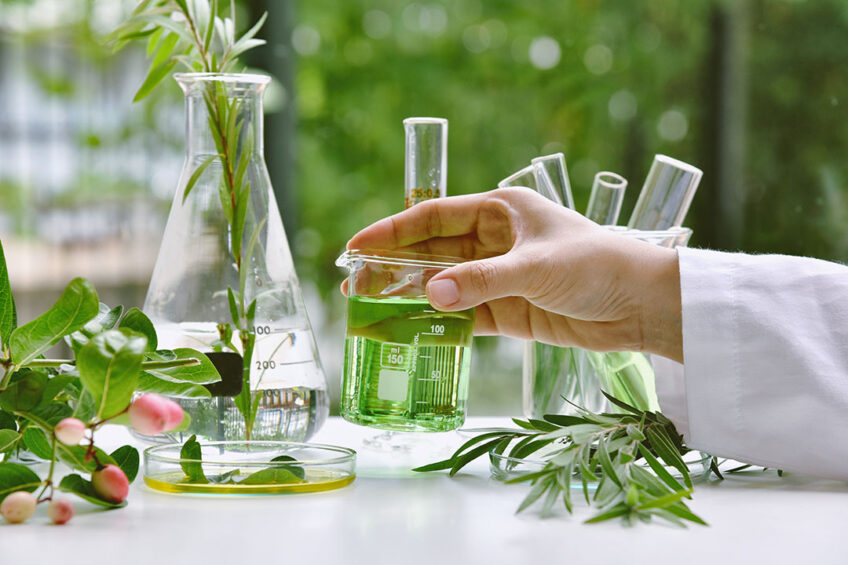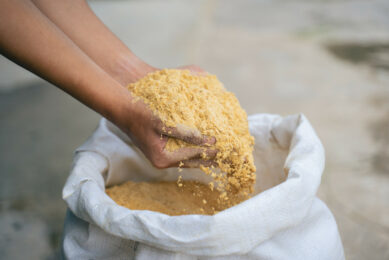Phytogenics improve livestock performance and sustainability

Phytogenics are natural additives that have many benefits. This article discusses the impact of phytogenics on the performance and sustainability of livestock.
Phytogenics are natural compounds with beneficial properties such as antimicrobial, antioxidant, anti-inflammatory, and immunomodulatory activities. In addition, phytogenics improve growth, reproduction performance and health status, and reduce methane and ammonia emissions. This is why phytogenics can be used as a safe feed additive to increase the sustainable development of animal husbandry.
Impact on growth performance
Pigs
Phytogenic feed additives are widely used as growth promoters in pigs, poultry, and ruminants’ diet to improve production efficiency. Studies show that a mixture of herbal extracts of buckwheat, thyme, curcuma, black pepper and ginger increases feed intake and the growth performance of pigs. An herbal blend of benzoic acid and thymol, eugenol, and piperine essential oils promotes piglet growth performance by improving average daily gain, average daily feed intake, apparent total tract digestibility of nutrients and energy. In addition, dietary supplementation of commercial phytogenics in sows during gestation/lactation increases litter size, live births, and the composition and bioactivity of colostrum and milk, thus improving offspring health and performance. It is also seen that adding thymol and cinnamaldehyde in the diet of weaned piglets enhances body weight gain, thus improving performance.
Poultry
Further, a blend of cinnamon, garlic, ginger and oregano improves body weight gain and feed availability in turkeys, quail and laying hens. The inclusion of peppermint leaves in laying hen diets increases egg weight, egg production and egg mass. In addition, dietary supplementation of carvacrol, cinnamaldehyde and capsaicin increases body weight gain, feed utilisation and carcass energy retention, and it reduces heat loss in broilers.
Ruminants
Dietary supplementation of a blend of poplar and eucalyptus leaves in buffaloes increases daily milk yield, as well as the digestibility of dry matter, organic matter and neutral detergent fibre. A mixture of thyme, eucalyptus and celery in calf starter improves starter intake, daily gain and feed efficiency due to the modulation of ruminal fermentation and improvement of nutrient utilisation.
Impact on reproductive performance
From research it appears that Murraya koenigii alone or in combination with Aegle marmelos improved fertility in delayed pubertal buffalo heifers by increasing the ovulation and conception rates. Yucca powder supplementation increases the conception rate in dairy goats. Tinospora cordifolia plus Cassia fistula bark and Artocarpus heterophyllus leaves alleviate postpartum anoestrus in cattle. A blend of Radix Angelicae Sinensis, Rhizoma Ligustici, Semen Persicae, Rhizoma Zingiberis, and Radix Glycyrrhizae reduces the incidence of retained placenta and improved reproductive performance in Holstein dairy cows. Dietary inclusion of Eurycoma longifolia, Tribulus terrestris, and Leuzea carthamoides improves semen quality in boars.
Impact on health status
Phytogenic feed additives such as carvacrol, anethol, and limonene modulate gut mucin composition, improve the gut ecosystem and enhance immune system functions, thus improving the overall health of broilers. In addition, dietary inclusion of winter cherry improves the haematological profile and immunological status of broilers.
In pigs, dietary supplementation of red pepper essential oil increases the relative abundance of Lactobacillus and reduces the incidence of diarrhoea. Diets containing essential oils of eugenol, thymol, and piperine combined with benzoic acid decrease the relative abundance of pathogenic bacteria such as Campylobacter and Escherichia-Shigella, thus improving gut health in weaned piglets. In addition, thymol and cinnamaldehyde reduce inflammatory mediator levels and increase the lymphocyte proliferation rate, phagocytic rate, and IgA and IgM levels in the plasma of weaning pigs.
Impact on methane and ammonia emissions
It is seen that tannins, mangosteen peel powder, and green tea extract as feed additives reduce methane emissions in ruminants. Corymbia citriodora leaf extract, licorice extract, mulberry leaf flavonoids, and moringa seed oil reduce the number of ruminal protozoa as well as methane production. What’s more, Yucca extract reduces faecal odour and ammonia emissions on pig and poultry farms by reducing the activity of gut urease and urea cycle enzymes.
In broilers, thymol, eugenol and piperine improve total-tract nitrogen retention and reduce ammonia emissions. Dietary supplementation with essential oils from cinnamaldehyde, thymol and carvacrol in growing pigs decreases the emissions of ammonia and total faecal nitrogen by inhibiting microbial protease and urease activities.
This article is based on the publication: Wang J, Deng L, Chen M, Che Y, Li L, Zhu L, Chen G, Feng T, Phytogenic feed additives as natural antibiotic alternatives in animal health and production: A review of the literature of the last decade,
Animal Nutrition Journal











